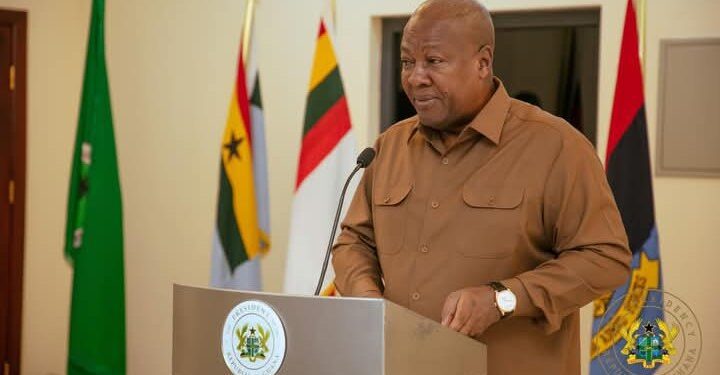President John Dramani Mahama has unveiled a comprehensive plan for the implementation of the 24-Hour Economy Policy, a flagship initiative that is set to be rolled out in July. Speaking at a multi-sectoral engagement at the Jubilee House, the President revealed that the policy has been thoroughly reviewed and is ready for implementation.
“We have a coherent and actionable framework with which to deliver the results,” President Mahama stated, emphasizing the importance of a stable macroeconomic environment in driving the policy’s success. To guarantee institutional stability, the President is working with Parliament to establish a 24-Hour Economy Secretariat as an independent authority, reporting directly to the President and backed by legislation.
A key highlight of the policy is the development of the Volta Lake Economic Corridor, which will transform the lake into a national logistics route.
“This corridor, centered on the Volta Lake and the Volta Basin, will become a national production zone and logistics hub,” the President announced.
The plan envisions cultivating over two million hectares of arable lakeside land, revitalizing the fishery sector on the lake, and creating a chain of industrial parks that produce goods for domestic and regional markets.
The government will invest in new floating assets, lake ports, and long-term partnerships to support this initiative.
“The lake will be activated as a transport highway, moving food, people, and goods more efficiently than our congested roads allow us to do currently,” President Mahama explained.
The 24-Hour Economy Policy is designed to be implemented from the ground up, with each district establishing its own 24-hour implementation task force, housed within the district and municipal assemblies, and aligned with the local economic development policy. This will allow each region to define and lead its path of industrial transformation based on its natural comparative advantages.
President Mahama outlined several initiatives to support the policy, including land and skills development programs.
“We will develop local land banks zoned, titled, and investment-ready to reduce delays and uncertainty to investors,” he said. The Aspire24 sub-program will train young people for shift-based work, digital roles, and entrepreneurship.
Infrastructure development will be led by the Ghana Infrastructure Investment Fund, which will oversee the construction of industrial parks, logistics hubs, and transport link upgrades. The Development Bank of Ghana and the Venture Capital Trust Fund will scale up value chain finance for SMEs, cooperatives, and agribusinesses in key sectors.
Mahama expressed optimism about the program’s potential, stating, “This is no longer just a vision. It is a structured, sequenced, and inclusive plan, and its implementation is beginning.” The draft program document will be released for public consultation, and the policy is set to be officially launched in July, coinciding with Ghana’s Republic Day.


















